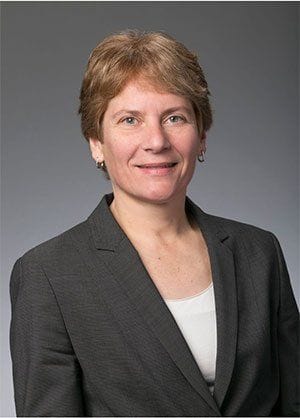In honor of LGBTQ+ STEM Day on November 18, 2020, ACS Axial is publishing a series of interviews with LGBTQ+ professionals from across the chemistry community, discussing their work, their stories, and how organizations can do a better job of supporting LGBTQ+ professionals in the workplace. View this year’s full list of interviews, as well as interviews for […]


Professor Carolyn R. Bertozzi is the Director of ChEM-H, and the Anne T. and Robert M. Bass Professor in the School of Humanities and Sciences and Professor, by courtesy, of Chemical and Systems Biology, at Stanford University and an Investigator of the Howard Hughes Medical Institute. She is the Editor-in-Chief of ACS Central Science.
What initially drew you to chemistry?
I fell in love with organic chemistry in my sophomore introductory course, taught by Professor David Evans at Harvard. Prior to that, I was an intended premed majoring in biology. After that year, I switched my major to chemistry, and thus my course was set.
What barriers did you face?
While I clearly had an affinity for organic chemistry as a subject, I had a difficult time finding a lab to work in as an undergraduate. So I was not able to put my conceptual learning to work in the laboratory, as I had hoped would be possible during my undergraduate years. This is when I first realized that women were unofficially blocked from entering certain areas of science (or at least the impediments made it very difficult). Prior to that, I had been rather sheltered, coming from an academic science family with two sisters.
Do you think LGBTQ acceptance is more common in the workplace today than when you started?
Yes, absolutely. The ridicule, exclusion, and sometimes outright hostility that I experienced as an undergrad and grad student in the 1980s has dissipated and is now far more dilute and generally considered unacceptable in the workplace.
What challenges remain?
Much of that homophobia and sexism (and let’s face it, these are two faces of the same coin) has gone underground, but it remains a scourge on the lives of many people. Also, while improvements have been dramatic in the U.S., this is not even across our country. And many international settings remain dangerous and even life-threatening places to be an out LGBTQ scientist and human.
What do you wish employers and managers knew about attracting and retaining LGBTQ chemists?
Anyone who leads an organization or unit aiming to make a major impact in science is probably already managing LQBTQ chemists and will want to recruit and retain them as part of their top talent mission. Doing this well is not rocket science. It is a matter of setting the example as a leader and articulating and exemplifying expectations around treating all people with dignity and respect, inclusion, and equity. Get educated about best practices – how you interact with coworkers and their family members, awareness of how LBGTQ lives may be differently affected by current events (especially political whims that target them here and abroad), open communication, and a safe space to speak the truth about our lives.
What does it look like for cisgender/heterosexual chemists to be good allies in 2020?
Speak up when your colleagues make inappropriate, disparaging, or thoughtless colleagues, in private if need be. Volunteer to participate in LGBTQ events, celebrate pride, boost the visibility of LGBTQ scientists whose work has been overlooked or underappreciated.
What advice would you give to younger LGBTQ chemists who may be struggling with being accepted as their authentic selves in the workplace?
Reach out to supportive peers and mentors – myself included! You are not alone and, though the pace may be slow, it does get better.